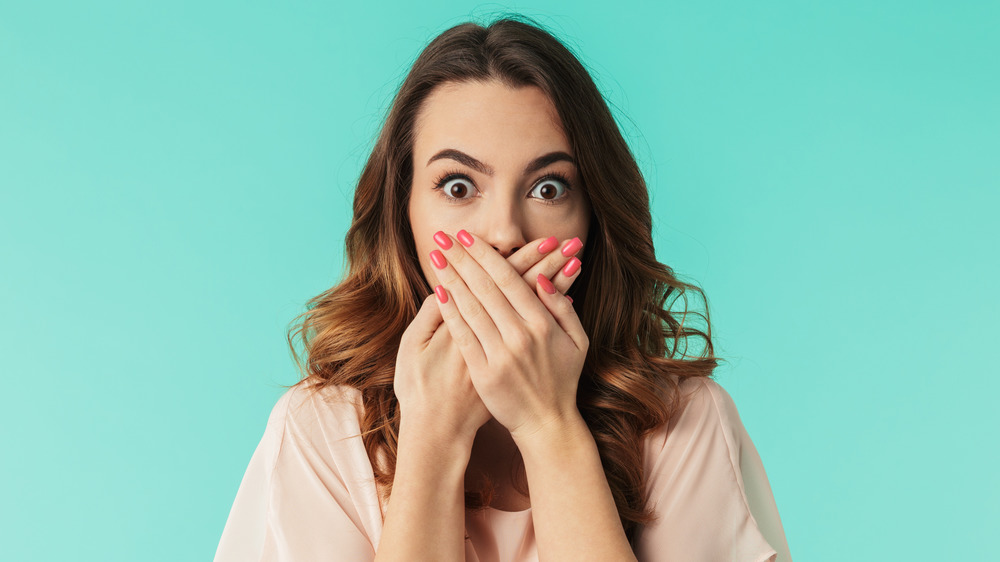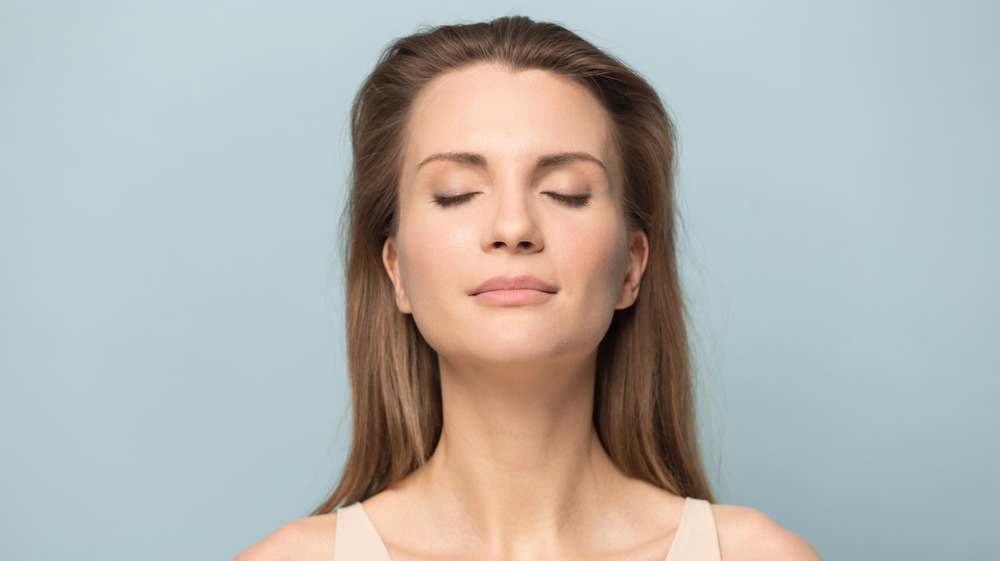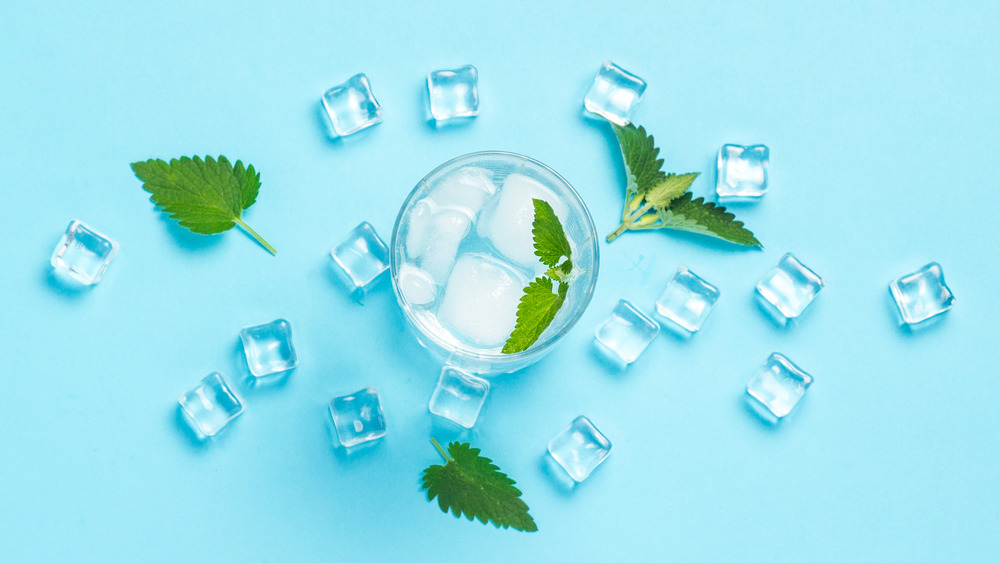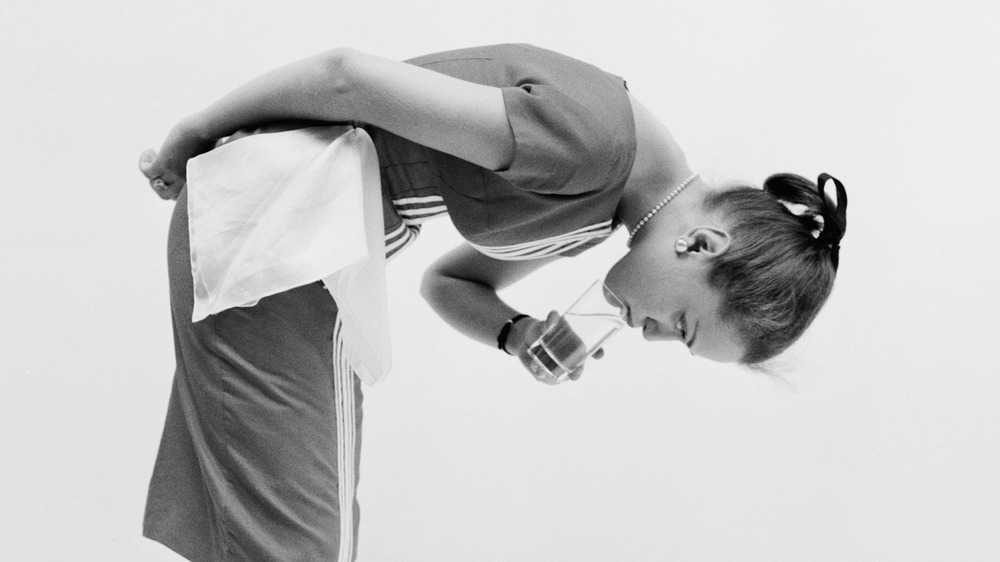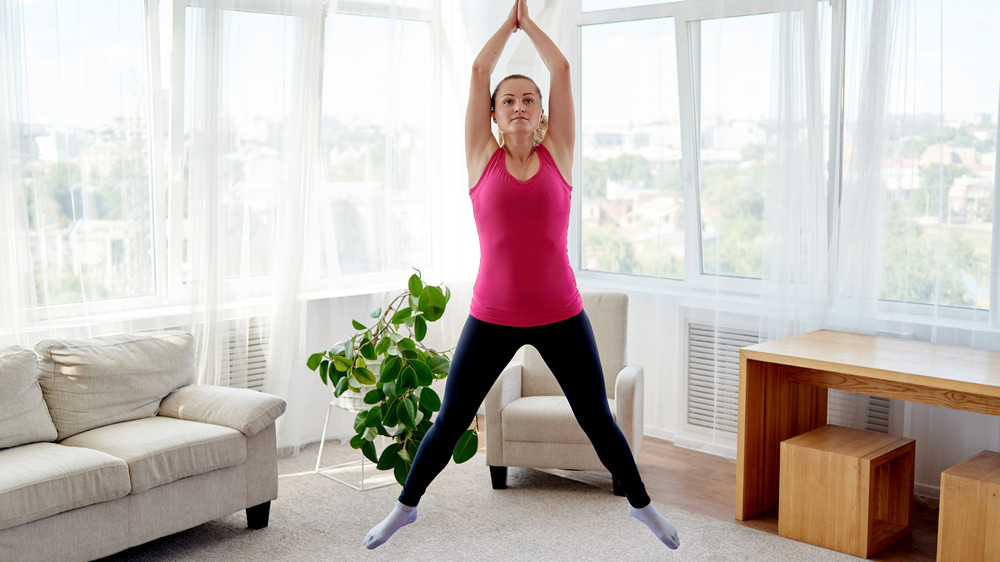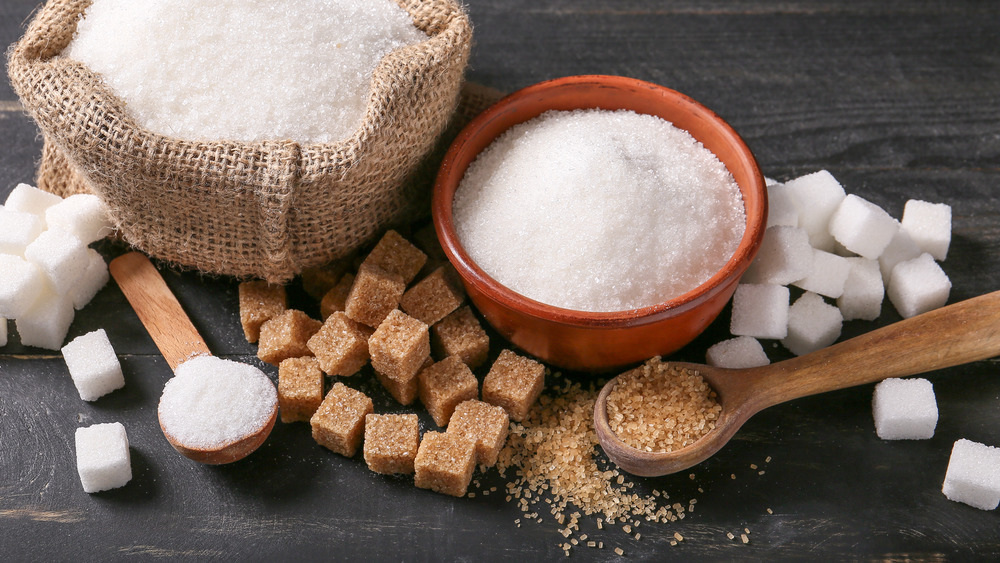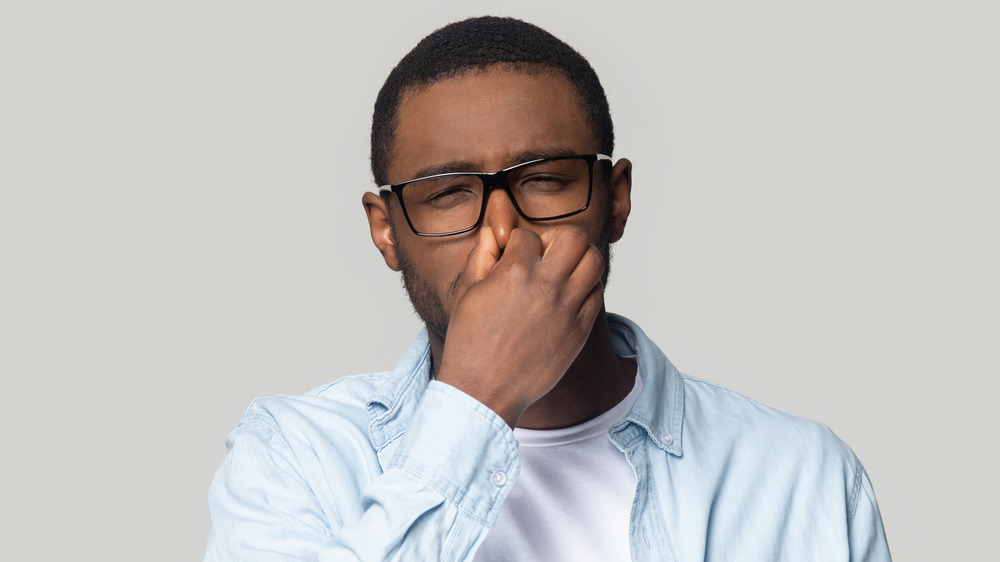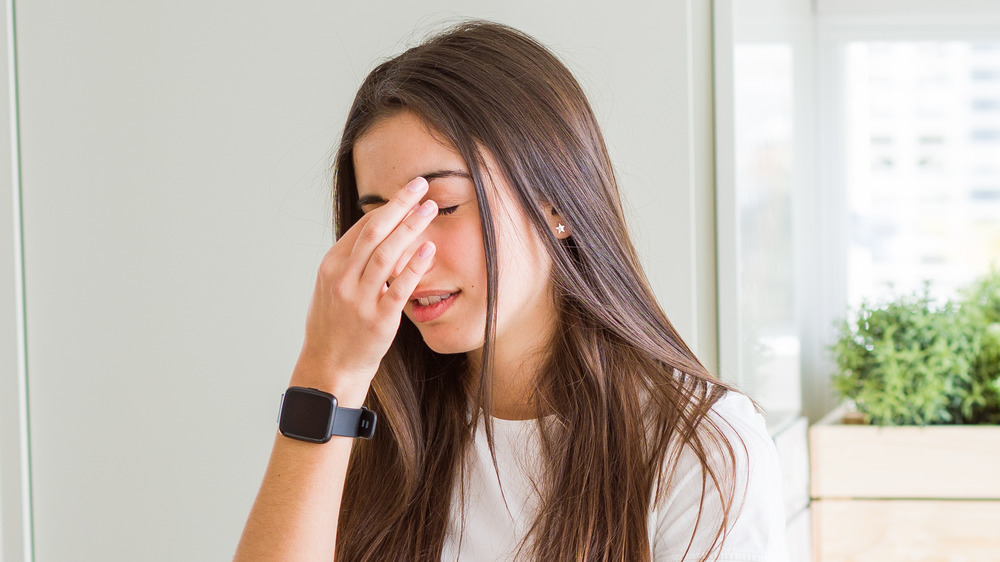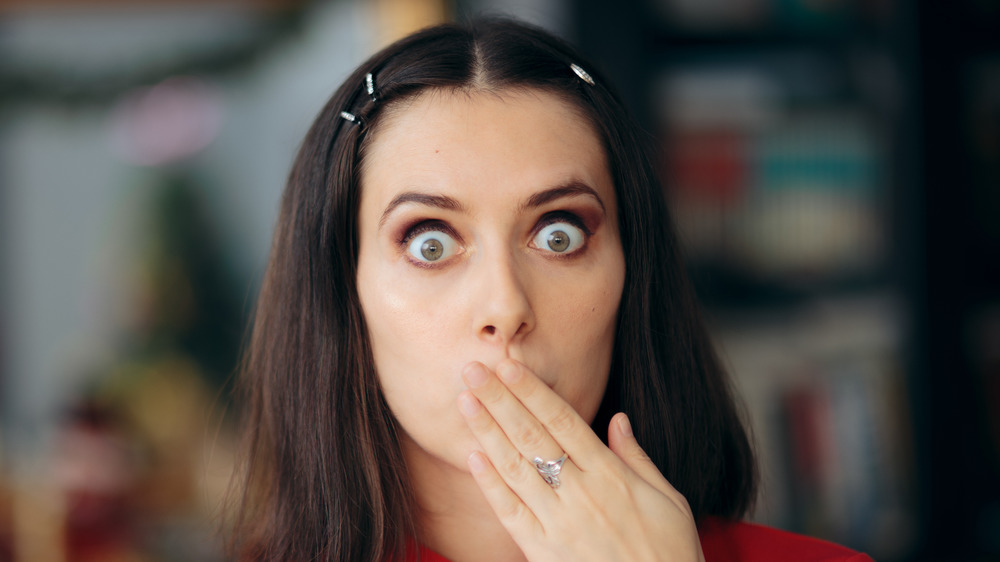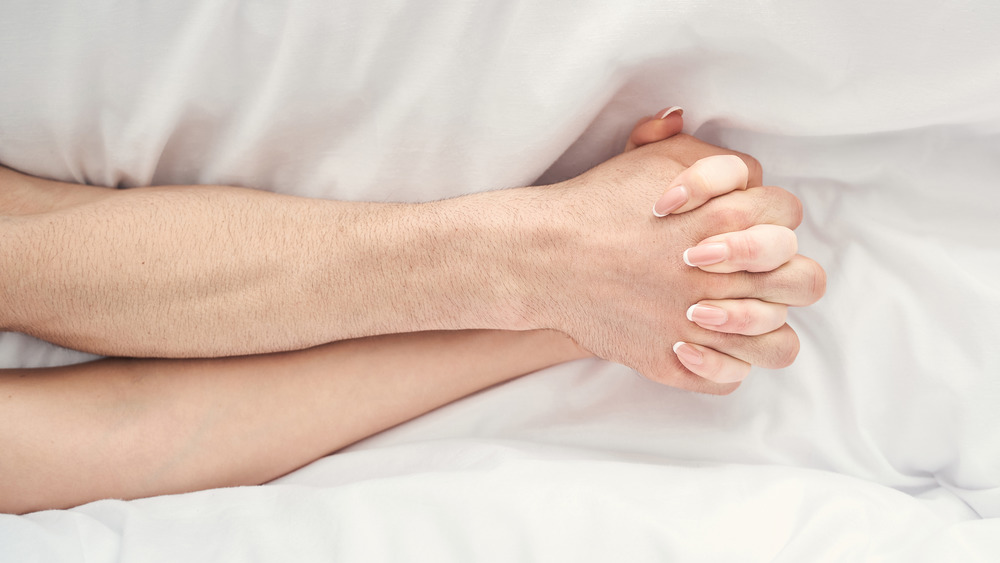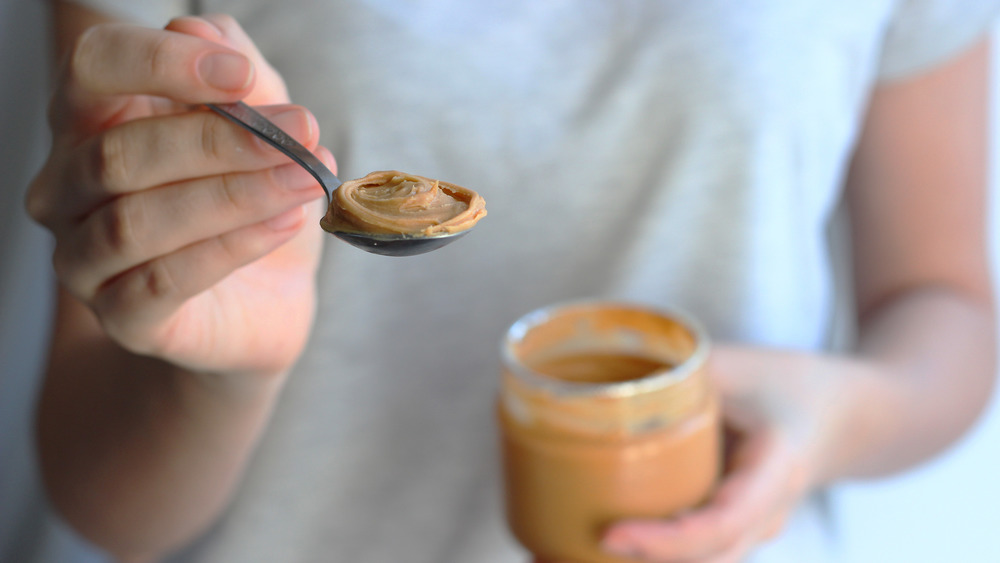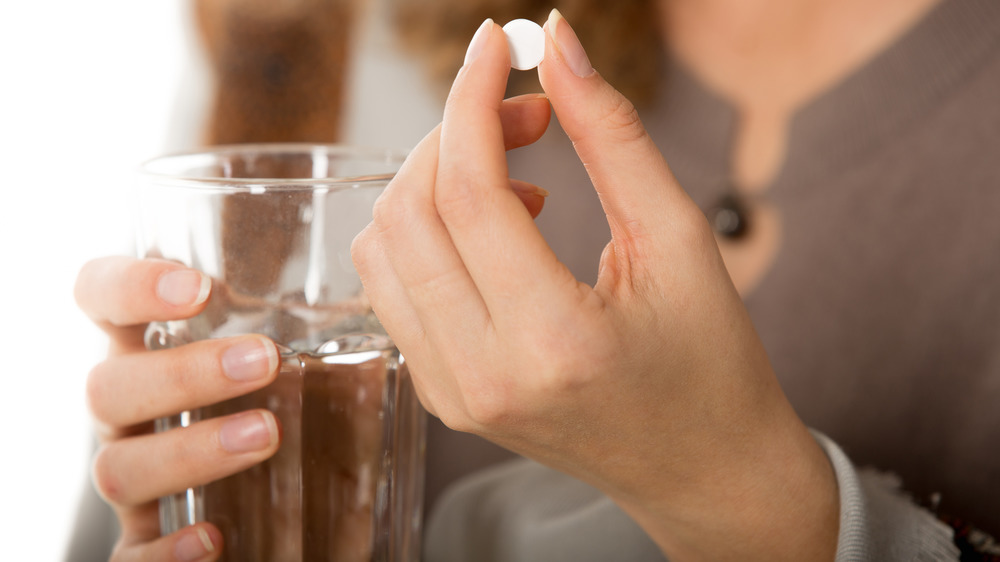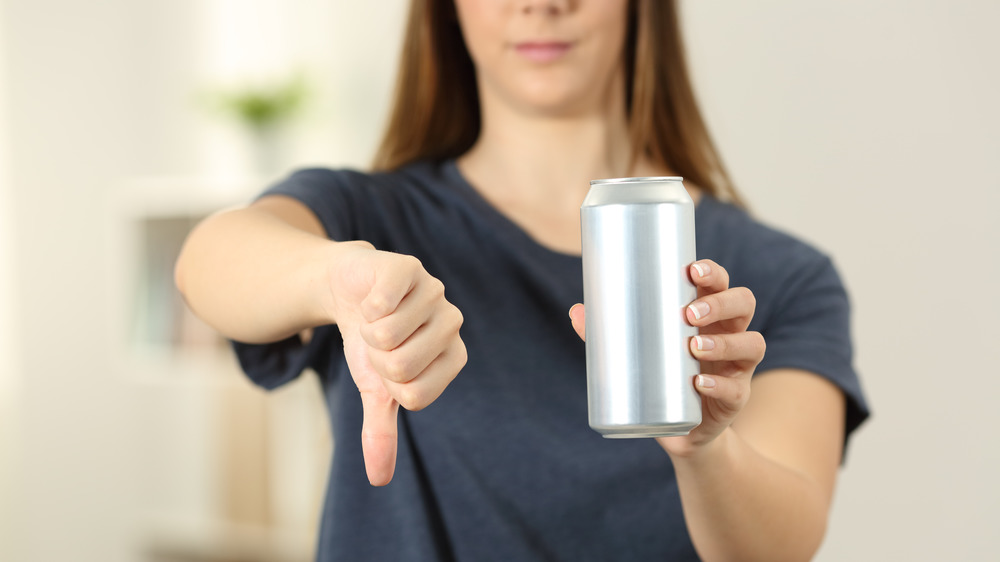Things That Will Actually Get Rid Of Your Hiccups
Hic-hic-hiccup. As explained by the Mayo Clinic, hiccups are "involuntary contractions of your diaphragm" that force "your vocal cords to close very briefly" creating that "characteristic 'hic' sound" you probably know all too well.
It can be infuriating when you have a disruptive case of these spasms. They can be loud, high pitched, and even embarrassing. Of course, in most instances, hiccuping is more of an inconvenience than an actual medical concern. But when they are persistent and percussive, you may be looking for any and all options to stop it from happening.
While there are plenty of old wives' tales promising to cure your hiccups, there are lots of remedies that do not deserve your time (or breath). Want to weed out the sillier techniques from the more effective ones? Not sure whether you should try a spoonful of sugar, a dollop of peanut butter, or some other tasty concoction? We are here to help put an end to those oh-so annoying hiccups by sharing a few tactics that have been mostly proven to work.
Try this breathing exercise to get rid of your hiccups
Taking a nice calming, cleansing breath may sound like an impossible feat when you are battling a raging case of the hiccups, but there are several simple exercises you can try to quell that non-stop jerk, jerk, jerking of your belly.
As suggested by Medical News Today, trying inhaling and holding for 10 seconds, then gradually release the air. Do this three to four times. If you still have the hiccups after your first attempt, give yourself a breather (pun intended), and try again in another 20 minutes. Alternatively, you can make like you are hyperventilating and huff and puff into a paper bag placed over your mouth and nose. You can also try lying down and putting your knees up to your chest for 120 seconds. The U.K.'s National Health Service also recommends squeezing your knees, but while leaning forward instead of lying down.
Hiccups can be curbed with ice cold water
If you cannot wait another minute until those frustrating involuntary convulsions come to an end, grab a glass of super cold water and try gargling — or just down the whole thing. This thirst-quenching activity stimulates the vagus nerve, and a 2020 study published in StatPearls found that your body's reaction to the chilly temperature of your beverage can, alone, act as a cure. It is worth a shot — even if it doesn't work. It will, at the very least, leave you feeling refreshed and hydrated, right?
Of course, if your teeth or mouth are sensitive to the cold, you can also just try sipping on room temperature or lukewarm H20. "My go-to home remedy is taking 20 tiny sips of water in a row, as quickly as possible," emergency room physician Dr. Celine Thum revealed in an interview with Self. She elaborated, "By swallowing water repeatedly, you can't breathe in so quickly, forcing your body to calm down. [This] slows down its nerve impulses to the diaphragm."
Drinking water upside down can quash your hiccups
We have all heard some downright ridiculous exercises for ridding ourselves of the hiccups, and, perhaps, you have had beginners' luck with one or two of these wild but worth-a-shot type of endeavors.
If you want to have a good laugh, give onlookers a giggle — and, hey, maybe even find success — give this trick a try. Dr. Erich Voigt, an otolaryngologist, told Business Insider that every single one of his patients who came to him looking for relief from hiccups — including one who had them consecutively for a week — found success by drinking a glass of water from the side of the glass opposite where the mouth would normally touch. Some people refer to this technique as drinking water "upside down" (via Insider).
Basically, you have to hunch over your glass to get the right angle and avoid spilling — but it may be worth it. "Because of the way its making the muscles contract, it [stops] hiccups," said Dr. Voight.
A little bit of cardio could cure your hiccups
Some DIY methods for getting rid of the hiccups call for increasing the amount of carbon dioxide, or CO2, in your bloodstream to stop the involuntary diaphragm movements, according to BBC Future.
In this vein, some proposed methods — holding your breath, drinking a glass of water without gulping for air, or huffing into a brown lunch bag — may work for you, as Dr. Andrea Paul, an internist, told Women's Health. Additionally, she said that if you "jog in place or do jumping jacks for 30 seconds," it might just "do the trick."
The site explained that a short spurt of cardio can be effective as it enables you to get additional oxygen, while mixing with different, necessary nutrients to create energy, which, in turn, helps you make more CO2. Additionally, it is worth noting that some in the medical field believe that hiccups are a result of low C02 levels. Thus, driving it up would be a commonsense approach (via BBC Future).
Chase your hiccups with bitters or a spoonful of sugar
A spoonful of sugar helps the ... hiccups go away! As early as the '70s, researchers recognized the effectiveness of this method. A 1971 study found that eating a small amount of granulated sugar cured the hiccups in 19 out of 20 patients (via Insider). As noted by Insider, the act of swallowing sugar is said to stimulate the vagus nerve, which should halt the hiccups.
If you are opposed to letting sugar dissolve in your mouth for one reason or another, there are a few other possibilities that may or may not warrant scientific legitimacy. Some people have found success sucking on a lemon coated in bitters. In fact, as reported by The New York Times, a bartender and doctor teamed up in 1996 to publish a report in The New England Journal of Medicine describing this so-called cure and its efficacy in treating 14 out of 16 patients. That said, all patients had hiccups caused by alcohol. Go figure.
Popping your ears can ease a case of the hiccups
You know when your ears suddenly feel funny while quickly ascending in an airplane? In response, you desperately try to resolve the pressure and restore your hearing by "popping" them? In this instance, you may find yourself performing the Valsalva maneuver, which, as explained by Vice, is the action of breathing out while simultaneously clasping your nose and shutting your mouth — making it so that, essentially, there is no place for the exhaled air to escape. This little trick is a common method to get rid of a nagging case of hiccups, as a 2016 study in the British Journal of General Practice found.
Dr. Brett Comer, ear, nose, and throat specialist, told Vice that the Valsalva maneuver is perfectly fine to try, as long as you are not blowing out too aggressively through your closed nose. Go easy, and do not continue trying if you do not have initial success.
Use acupressure to conquer your hiccups
There are several pressure points you can try stimulating to get rid of your stubborn hiccups. "One of my best treatments for hiccups is acupuncture or acupressure," Ralph Esposito, a licensed acupuncturist, told Byrdie. When you get the hiccups, Esposito recommends pressing down on the point called zhong kui, which he said translates to "back of the middle finger." He continued, saying, "It is located on the proximal interphalangeal joint (the first joint after your middle finger knuckle). Press this firmly for about five minutes on and off for relief."
Another option? Close your eyes, place a finger on each eyelid, and apply some gentle pressure (via BBC Future). This should activate the vagus nerve. If neither of the above pressure points are working for you, try pulling on your tongue — you know, before you pull out your hair from all that hiccuping. A 2020 study in StatPearls found that this method has been effective at eliminating hiccups.
As explained by Medical News Today, simply tug on the end of your tongue and hold it to, once again, get the vagus nerve activated. Of course, you can also go to the professionals for help. The Mayo Clinic suggests that acupuncture may be an avenue worth exploring, in addition to hypnosis.
Burp the hiccups away
Sometimes you have to fight fire with fire — or, you know, battle hiccups with a different action of the esophagus: burping. According to Medical News Today, many hiccup sufferers have found that sipping a bubbly soda and then forcing themselves to belch helped them to get rid of their hiccups. Of course, on the flip side, some fizz-filled drinks can actually incite hiccups, as noted by the site. So take this tip with a grain of salt.
As any parent will tell you, newborns who are frequently stricken with a case of hiccups can often be helped with a light burping session — so maybe there is some solid truth to the above suggestion. Medical News Today explained that this may do the trick for an infant since patting Baby's back can help to release the trapped gas, a potential cause for that adorable tiny hiccuping.
This unconventional method may cure your hiccups (and curl your toes)
If you want to kill two birds with one stone so to speak, try getting rid of your hiccups by getting worked up in the bedroom. As it turns out, having an orgasm can help you in more ways than one; a case report published in Canadian Family Physician found that climaxing can potentially cure hiccups. Researchers aren't sure if this instant fix is directly linked to ejaculation — thus, they are not as confident that women will have as much success. It certainly does not hurt to try though, right? So, ladies, next time you are hiccuping, feel free to give it a go.
Another possible and intimate option for hiccup relief? Rectal massage. As reported in The Journal of Internal Medicine, two separate cases of persistent hiccups were instantly ceased after digital rectal massage — it's true.
Getting scared or distracting yourself can quell hiccups
Fixating on your hiccups and how to get rid of them may not be doing your any favors. In fact, your fervent efforts may be counterproductive. Simply distracting yourself with other matters may help — if you are able to muster up the motivation to think of anything else.
As suggested by Healthline, just giving yourself the time and grace and space to "play a video game, fill out a crossword puzzle, or do some calculations in your head," could do the trick. Basically, try anything that makes you use your brain and remain engaged.
Of course, you could also ask someone to scare you. While there is no concrete scientific data to back up this technique, anecdotal evidence points to its potential efficacy. "The mechanism isn't well understood, but [techniques like being scared are] all probably an attempt to reset the hiccup reflex arc or alter our breathing pattern," Dr. Michael Richardson, a primary care provider, told HuffPost. Ironically, "being suddenly excited or scared" can also "cause that repetitive involuntary contraction of the diaphragm" known as hiccups, according to the Mayo Clinic.
A spoonful of peanut butter could cure your hiccups, but not for the reason you might think
Regular hiccuper Coleen O'Lear described her chronic convulsive bouts as "rapid fire" to The Guardian. She further revealed the one thing that helped quell her most disruptive bouts: A dollop of creamy peanut butter. While she had a hunch that this was linked to the spread's ability to envelope and soothe her esophagus, internist Dr. Tyler Cymet asserts that this phenomenon is more likely psychological. "The peanut butter is a type of cognitive behavioural therapy, where you're controlling your breathing and thinking about what you're doing instead of getting anxious," he told the publication.
In truth, Dr. Cymet believes that no one thing can truly cure a case of the hiccups. After performing extensive research using various tactics and tricks, he concluded that hiccups are just one of those things that "starts and stops on its own, and that's about it." Psychological or not, if peanut butter works for you, have at it.
Medications can treat recurrent hiccups
Most of the time, hiccups are fairly harmless. Sure, they can be an inconvenience, but they will come, they will go, and, aside from being a little annoyed, you will be no worse for the wear. In some circumstances, however, recurring or nonstop hiccups could be a symptom of an underlying medical issue (via Mayo Clinic).
If you are concerned about incessant hiccups (or just can't stand it anymore), do not hesitate to talk to your doctor. An internist may want to evaluate the situation, and may even perform some blood work, imaging tests, or procedures (like an endoscopy).
If no other condition is noted, your internist may prescribe a medication such as Baclofen, Chlorpromazine, or Metoclopramide, as explained by the Mayo Clinic. If medication doesn't help, your physician may choose to use "an anesthetic to block your phrenic nerve to stop hiccups" or "surgically implant a battery-operated device to deliver mild electrical stimulation to your vagus nerve," according to the site.
Make lifestyle changes to get rid of your hiccups altogether
If you find that you tend to get hiccups on the regular, the best thing you can do is try to prevent them in the first place. This may mean you will have to pay better attention to your diet choices and curb a few habits.
For starters, you will want to slow down when you eat and drink, as noted by Medical News Today. Swallowing air while chewing can bring on a case. Alcohol is another common catalyst, so take it easy on the booze. If spicy dishes are your go-to for meals, you may have to either tame the heat or deal with the consequences. Still smoking? There are plenty of good reasons to quit, and hiccuping may be the least glaring motivator, but lighting up is indeed a trigger. Of course, if you still find yourself with regular hiccups despite your best efforts to quell them, talk to your doctor; there could be a more serious medical issue at play.

